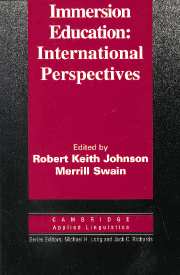Book contents
- Frontmatter
- Contents
- List of contributors
- Series editors' preface
- Preface
- Chapter 1 Immersion education: A category within bilingual education
- I IMMERSION IN A FOREIGN LANGUAGE
- II IMMERSION FOR MAJORITY-LANGUAGE STUDENTS IN A MINORITY LANGUAGE
- III IMMERSION FOR LANGUAGE REVIVAL
- IV IMMERSION FOR LANGUAGE SUPPORT
- V IMMERSION IN A LANGUAGE OF POWER
- VI LESSONS FROM EXPERIENCE AND NEW DIRECTIONS
- Index
VI - LESSONS FROM EXPERIENCE AND NEW DIRECTIONS
Published online by Cambridge University Press: 05 October 2012
- Frontmatter
- Contents
- List of contributors
- Series editors' preface
- Preface
- Chapter 1 Immersion education: A category within bilingual education
- I IMMERSION IN A FOREIGN LANGUAGE
- II IMMERSION FOR MAJORITY-LANGUAGE STUDENTS IN A MINORITY LANGUAGE
- III IMMERSION FOR LANGUAGE REVIVAL
- IV IMMERSION FOR LANGUAGE SUPPORT
- V IMMERSION IN A LANGUAGE OF POWER
- VI LESSONS FROM EXPERIENCE AND NEW DIRECTIONS
- Index
Summary
Each of the three chapters in this section derives lessons from experience that have important implications for the future of immersion education. Myriam Met and Eileen B. Lorenz are involved in immersion program curriculum development, teacher training, and administration in the United States. The lessons they derive from two decades of experience across a wide range of U.S. programs are drawn from Spanish, a widely spoken minority language, as well as French, German, Japanese, and Chinese. The problems and issues discussed by Met and Lorenz include administrative issues that are particularly important to consider when planning a new program, and classroom issues that are central to its successful implementation.
As Met and Lorenz point out, immersion in the United States has been successful in the sense that new programs are being initiated every year. Yet the support for these programs may prove fragile. They lack both the ideological commitment that can sustain language revival and support programs and the pragmatic incentives for maintaining immersion in a language of power. As a result, the success of immersion in the United States depends heavily on the commitment of administrators, teachers, and parents who make the organizational and instructional decisions that shape the programs. This school-based rather than system-based orientation of immersion programs can lead to problems of articulation within the education system as early immersion students move to middle and then to secondary school.
- Type
- Chapter
- Information
- Immersion EducationInternational Perspectives, pp. 239 - 242Publisher: Cambridge University PressPrint publication year: 1997



